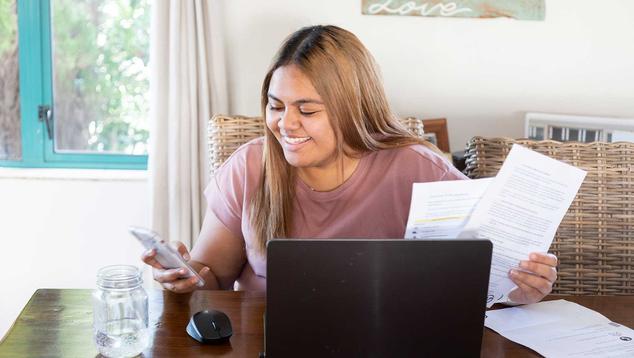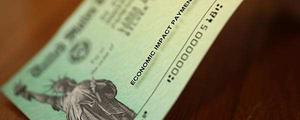Story Highlights
- Percentage rating their finances as excellent or good returns to 2019 level
- Slight majority now perceive their financial situation is improving
- Heightened worry in 2020 about paying bills, mortgage has abated
WASHINGTON, D.C. -- After slipping last April, the percentage of Americans feeling positive about their finances has fully rebounded to where it was in 2019. Fifty-seven percent now describe their current financial situation as excellent or good. That is one percentage point higher than the 56% recorded in 2019 and significantly better than the 49% recorded a year ago, at the start of the pandemic.

Line graph. Annual trend from 2003 to 2021 in percentage of Americans rating their personal finances excellent or good. Figure was 50% in 2003 and remained high through 2007 before dipping to 42% in 2009. It subsequently increased gradually to 56% in 2019 before dropping to 49% in 2020 but is now back to 57%.
An interim Gallup update of this measure last June found a partial recovery in Americans' confidence in their finances, with 53% describing them as excellent or good. This occurred as much of the country was reopening following lockdowns that had temporarily slowed the rate of COVID-19 infections before they spiked again later that month.
Not only are Americans feeling upbeat about their current financial health, but the majority, 52%, also say their financial situation is getting better.
This comes after U.S. adults' financial optimism fell to 35% last April from a near record-high 57% in 2019. The only time such optimism had been higher in the trend's history was in the months immediately following 9/11, when public confidence in the nation's economy was rebounding from the initial shock of the terrorist attacks.

Line graph. Annual trend from 2003 to 2021 in percentage of Americans saying their financial situation is getting better. Was in 2003 rising to 51% in 2007 before plunging to 32% in 2008 during the recession. It subsequently increased gradually to 57% in 2019 before plunging again, to 35%, in 2020. It is now largely recovered to 52%.
These findings mirror Americans' improved views of the nation's economy, with the Gallup Economic Confidence Index becoming positive this month, the first time it has been positive since the pandemic began.
Positive Financial Views Recover, but Not Among Young Adults, Middle Class
Combining respondents' answers to the two personal finance questions, close to half of U.S. adults (46%) now feel consistently positive about their finances -- either describing them as excellent or good and as getting better or staying the same. This is nearly double the percentage feeling negative (25%), defined as those describing their finances as only fair or poor and as staying the same or getting worse. Another 28% are mixed, either saying their finances are excellent or good and worsening, or are only fair or poor but improving.
The 46% feeling positive is up from 34% in April 2020 and nearly restored to the 48% recorded in 2019.
Positive feelings about one's finances, as captured by this metric, are strongly related to household income, ranging from 25% among those earning less than $40,000 per year to 74% among those earning $100,000 or more. Notably, the positive rating has fully recovered from 2020 among the highest and lowest income earners but remains subdued, at 43%, among those earning between $40,000 and less than $100,000.
While differences by age were slight in 2019, they emerged in 2020, as positive feelings about personal finances fell more sharply among adults aged 18 to 34 than among those aged 35 and older. Since then, positive sentiment has not rebounded as strongly among young adults as with the older groups, continuing the age gap.
| April 2019 | April 2020 | April 2021 | ||||||||||||||||||||||||||||||||||||||||||||||||||||||||||||||||||||||||||||||||||||||||||||||||||
|---|---|---|---|---|---|---|---|---|---|---|---|---|---|---|---|---|---|---|---|---|---|---|---|---|---|---|---|---|---|---|---|---|---|---|---|---|---|---|---|---|---|---|---|---|---|---|---|---|---|---|---|---|---|---|---|---|---|---|---|---|---|---|---|---|---|---|---|---|---|---|---|---|---|---|---|---|---|---|---|---|---|---|---|---|---|---|---|---|---|---|---|---|---|---|---|---|---|---|---|---|
| % | % | % | ||||||||||||||||||||||||||||||||||||||||||||||||||||||||||||||||||||||||||||||||||||||||||||||||||
| U.S. adults | 48 | 34 | 46 | |||||||||||||||||||||||||||||||||||||||||||||||||||||||||||||||||||||||||||||||||||||||||||||||||
| Household income | ||||||||||||||||||||||||||||||||||||||||||||||||||||||||||||||||||||||||||||||||||||||||||||||||||||
| $100,000 or more | 70 | 48 | 74 | |||||||||||||||||||||||||||||||||||||||||||||||||||||||||||||||||||||||||||||||||||||||||||||||||
| $40,000 to $99,999 | 58 | 40 | 43 | |||||||||||||||||||||||||||||||||||||||||||||||||||||||||||||||||||||||||||||||||||||||||||||||||
| Less than $40,000 | 22 | 14 | 25 | |||||||||||||||||||||||||||||||||||||||||||||||||||||||||||||||||||||||||||||||||||||||||||||||||
| Age | ||||||||||||||||||||||||||||||||||||||||||||||||||||||||||||||||||||||||||||||||||||||||||||||||||||
| 18 to 34 | 48 | 27 | 36 | |||||||||||||||||||||||||||||||||||||||||||||||||||||||||||||||||||||||||||||||||||||||||||||||||
| 35 to 54 | 43 | 39 | 50 | |||||||||||||||||||||||||||||||||||||||||||||||||||||||||||||||||||||||||||||||||||||||||||||||||
| 55+ | 52 | 34 | 50 | |||||||||||||||||||||||||||||||||||||||||||||||||||||||||||||||||||||||||||||||||||||||||||||||||
| Party ID | ||||||||||||||||||||||||||||||||||||||||||||||||||||||||||||||||||||||||||||||||||||||||||||||||||||
| Republicans/Lean Republican | 66 | 46 | 37 | |||||||||||||||||||||||||||||||||||||||||||||||||||||||||||||||||||||||||||||||||||||||||||||||||
| Democrats/Lean Democratic | 34 | 25 | 55 | |||||||||||||||||||||||||||||||||||||||||||||||||||||||||||||||||||||||||||||||||||||||||||||||||
| Figures are percentages of each group rating their current finances as either excellent or good and believing their financial situation is either getting better or staying the same. | ||||||||||||||||||||||||||||||||||||||||||||||||||||||||||||||||||||||||||||||||||||||||||||||||||||
| Gallup | ||||||||||||||||||||||||||||||||||||||||||||||||||||||||||||||||||||||||||||||||||||||||||||||||||||
Republicans (including independents who lean Republican) are less positive about their finances today than they were a year ago, while Democrats and Democratic leaners are now substantially more positive. These shifts are consistent with the change in presidential leadership from the Republican to the Democratic Party.
Importantly, these partisan reactions do not explain the lag in middle-income Americans' and young adults' financial optimism. Middle-income Americans in this poll are only a bit more likely than lower-income adults to identify as Republican, and no different from upper-income adults. Similarly, young adults are not more Republican than their older and younger counterparts; if anything, they are slightly more Democratic.
Worry Subsides About Meeting Basic Expenses
A separate question in the latest poll, conducted April 1-21, asked Americans how concerned they are about eight specific aspects of their finances. According to Gallup's annual trends on these measures, consumer worry has receded to 2019 levels on most, after worry about several of the matters increased at the beginning of the pandemic.
In particular, Americans expressed heightened worry last April about three of the more day-to-day financial issues on the list: paying their normal monthly bills; paying their rent, mortgage or other housing costs; and making minimum payments on credit cards. All three of those concerns have abated this year and are back to their 2019 levels or better.
Americans also became slightly more worried last year (59%) than they were in 2019 (54%) about having enough money for retirement. But unlike some other worries, this one has not subsided, as 58% still say they are very or moderately worried about it.
The majority of U.S. adults are worried about paying for medical costs in the case of a serious illness or accident, but that hasn't changed appreciably in recent years. Worry has also been fairly stable about maintaining the standard of living they enjoy, paying medical costs for normal healthcare and paying for their children's college expenses.
| April 2019 | April 2020 | April 2021 | Change (2020 to 2021) | ||||||||||||||||||||||||||||||||||||||||||||||||||||||||||||||||||||||||||||||||||||||||||||||||
|---|---|---|---|---|---|---|---|---|---|---|---|---|---|---|---|---|---|---|---|---|---|---|---|---|---|---|---|---|---|---|---|---|---|---|---|---|---|---|---|---|---|---|---|---|---|---|---|---|---|---|---|---|---|---|---|---|---|---|---|---|---|---|---|---|---|---|---|---|---|---|---|---|---|---|---|---|---|---|---|---|---|---|---|---|---|---|---|---|---|---|---|---|---|---|---|---|---|---|---|
| % | % | % | pct. pts. | ||||||||||||||||||||||||||||||||||||||||||||||||||||||||||||||||||||||||||||||||||||||||||||||||
| Money for retirement | 54 | 59 | 58 | -1 | |||||||||||||||||||||||||||||||||||||||||||||||||||||||||||||||||||||||||||||||||||||||||||||||
| Medical costs for a serious illness or accident | 51 | 54 | 54 | 0 | |||||||||||||||||||||||||||||||||||||||||||||||||||||||||||||||||||||||||||||||||||||||||||||||
| Maintaining standard of living you enjoy | 42 | 48 | 45 | -3 | |||||||||||||||||||||||||||||||||||||||||||||||||||||||||||||||||||||||||||||||||||||||||||||||
| Medical costs for normal healthcare | 42 | 43 | 41 | -2 | |||||||||||||||||||||||||||||||||||||||||||||||||||||||||||||||||||||||||||||||||||||||||||||||
| Paying for children's college | 36 | 33 | 34 | +1 | |||||||||||||||||||||||||||||||||||||||||||||||||||||||||||||||||||||||||||||||||||||||||||||||
| Paying normal monthly bills | 36 | 43 | 32 | -11 | |||||||||||||||||||||||||||||||||||||||||||||||||||||||||||||||||||||||||||||||||||||||||||||||
| Rent, mortgage, other housing costs | 30 | 39 | 30 | -9 | |||||||||||||||||||||||||||||||||||||||||||||||||||||||||||||||||||||||||||||||||||||||||||||||
| Making minimum payment on credit cards | 20 | 26 | 17 | -9 | |||||||||||||||||||||||||||||||||||||||||||||||||||||||||||||||||||||||||||||||||||||||||||||||
| Gallup | |||||||||||||||||||||||||||||||||||||||||||||||||||||||||||||||||||||||||||||||||||||||||||||||||||
Unemployment Declines as a Top-Named Financial Problem, but Still Elevated
Americans' answers to an open-ended question asking about the most important financial problem facing their family have also shifted in the past year, with fewer now citing unemployment while more are mentioning taxes and the high cost of living. While down from 12% last April, the 7% citing unemployment is higher than the 3% mentioning it in 2019, reflective of the continued elevation of the U.S. unemployment rate -- currently at 6%.
Taxes were far from people's minds at this time a year ago, eliciting a record-low 1% of responses for this question. Now, 7% cite them, similar to the 8% recorded in 2019. In 2019, similar percentages of all party groups mentioned taxes, whereas today it's mostly Republicans doing so.
General "lack of money" or "low wages" remains the top-mentioned financial problem people have, but the 10% naming it this year is consistent with the annual trend in recent years.
| April 2019 | April 2020 | April 2021 | |||||||||||||||||||||||||||||||||||||||||||||||||||||||||||||||||||||||||||||||||||||||||||||||||
|---|---|---|---|---|---|---|---|---|---|---|---|---|---|---|---|---|---|---|---|---|---|---|---|---|---|---|---|---|---|---|---|---|---|---|---|---|---|---|---|---|---|---|---|---|---|---|---|---|---|---|---|---|---|---|---|---|---|---|---|---|---|---|---|---|---|---|---|---|---|---|---|---|---|---|---|---|---|---|---|---|---|---|---|---|---|---|---|---|---|---|---|---|---|---|---|---|---|---|---|
| % | % | % | |||||||||||||||||||||||||||||||||||||||||||||||||||||||||||||||||||||||||||||||||||||||||||||||||
| Lack of money/Low wages | 11 | 11 | 10 | ||||||||||||||||||||||||||||||||||||||||||||||||||||||||||||||||||||||||||||||||||||||||||||||||
| Cost of owning/renting a home | 8 | 9 | 9 | ||||||||||||||||||||||||||||||||||||||||||||||||||||||||||||||||||||||||||||||||||||||||||||||||
| High cost of living/Inflation | 6 | 3 | 8 | ||||||||||||||||||||||||||||||||||||||||||||||||||||||||||||||||||||||||||||||||||||||||||||||||
| Healthcare costs | 17 | 8 | 8 | ||||||||||||||||||||||||||||||||||||||||||||||||||||||||||||||||||||||||||||||||||||||||||||||||
| Taxes | 8 | 1 | 7 | ||||||||||||||||||||||||||||||||||||||||||||||||||||||||||||||||||||||||||||||||||||||||||||||||
| College expenses/Student loans/Student loan debt | 8 | 5 | 7 | ||||||||||||||||||||||||||||||||||||||||||||||||||||||||||||||||||||||||||||||||||||||||||||||||
| Unemployment/Loss of job | 3 | 12 | 7 | ||||||||||||||||||||||||||||||||||||||||||||||||||||||||||||||||||||||||||||||||||||||||||||||||
| Too much debt/Not enough money to pay debts | 6 | 7 | 6 | ||||||||||||||||||||||||||||||||||||||||||||||||||||||||||||||||||||||||||||||||||||||||||||||||
| Effects of coronavirus situation | -- | 5 | 3 | ||||||||||||||||||||||||||||||||||||||||||||||||||||||||||||||||||||||||||||||||||||||||||||||||
| Retirement savings | 5 | 4 | 3 | ||||||||||||||||||||||||||||||||||||||||||||||||||||||||||||||||||||||||||||||||||||||||||||||||
| Insurance/Life insurance | -- | -- | 2 | ||||||||||||||||||||||||||||||||||||||||||||||||||||||||||||||||||||||||||||||||||||||||||||||||
| State of the economy | 1 | 3 | 2 | ||||||||||||||||||||||||||||||||||||||||||||||||||||||||||||||||||||||||||||||||||||||||||||||||
| Stock market/Investments | * | 4 | 2 | ||||||||||||||||||||||||||||||||||||||||||||||||||||||||||||||||||||||||||||||||||||||||||||||||
| Lack of savings | 1 | 2 | 2 | ||||||||||||||||||||||||||||||||||||||||||||||||||||||||||||||||||||||||||||||||||||||||||||||||
| Supporting parents/children/grandchildren | -- | 2 | 2 | ||||||||||||||||||||||||||||||||||||||||||||||||||||||||||||||||||||||||||||||||||||||||||||||||
| Energy costs/Oil and gas prices | -- | * | 1 | ||||||||||||||||||||||||||||||||||||||||||||||||||||||||||||||||||||||||||||||||||||||||||||||||
| Credit card debt | -- | 1 | 1 | ||||||||||||||||||||||||||||||||||||||||||||||||||||||||||||||||||||||||||||||||||||||||||||||||
| Social Security | 1 | * | 1 | ||||||||||||||||||||||||||||||||||||||||||||||||||||||||||||||||||||||||||||||||||||||||||||||||
| Interest rates | 1 | * | * | ||||||||||||||||||||||||||||||||||||||||||||||||||||||||||||||||||||||||||||||||||||||||||||||||
| Transportation/Commuting costs | * | * | * | ||||||||||||||||||||||||||||||||||||||||||||||||||||||||||||||||||||||||||||||||||||||||||||||||
| Controlling spending | * | * | * | ||||||||||||||||||||||||||||||||||||||||||||||||||||||||||||||||||||||||||||||||||||||||||||||||
| Other | 5 | 7 | 2 | ||||||||||||||||||||||||||||||||||||||||||||||||||||||||||||||||||||||||||||||||||||||||||||||||
| None | 20 | 18 | 16 | ||||||||||||||||||||||||||||||||||||||||||||||||||||||||||||||||||||||||||||||||||||||||||||||||
| No opinion | 2 | 1 | 4 | ||||||||||||||||||||||||||||||||||||||||||||||||||||||||||||||||||||||||||||||||||||||||||||||||
| Percentages total more than 100% due to multiple responses. * Less than 0.5% |
|||||||||||||||||||||||||||||||||||||||||||||||||||||||||||||||||||||||||||||||||||||||||||||||||||
| Gallup | |||||||||||||||||||||||||||||||||||||||||||||||||||||||||||||||||||||||||||||||||||||||||||||||||||
Bottom Line
A year ago at this time, nearly 15% of the workforce was unemployed and 30% of Americans had experienced job loss or income reduction of some kind related to the pandemic. Naturally, Americans' confidence in their finances, and particularly their perception of the direction in which their finances were headed, was shaken.
But with the unemployment rate down by more than half and the vaccine rollout picking up steam, Americans' views of their finances have generally rebounded. Feelings of financial recovery are uneven across the income spectrum and by age, with upper-income and older Americans bouncing back quicker than middle-income and younger adults.
View complete question responses and trends (PDF download).
Learn more about how the Gallup Poll Social Series works.




